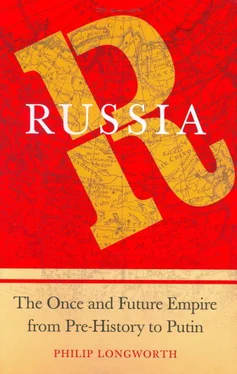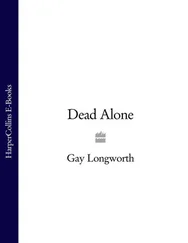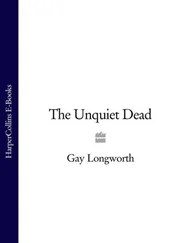Meanwhile he was introducing Soviet citizens to democratic practices which chimed with Western conceptions. At the Party congress in February 1986, when the policies of glasnost and perestroika were proclaimed, Gorbachev not only undertook to promote individual legal rights but also announced that electors would in future be allowed a choice of candidates (a practice already introduced in Hungary). The idea was also mooted of creating a two-party system by splitting the Communist Party of the Soviet Union between its liberal and conservative wings and sharing the assets between them. 7In private apartments, bars and hotel lobbies across the Soviet Union crowds gathered round television sets to watch the proceedings. They were not accustomed to the sight of democracy in action, after all, and they watched with quiet fascination, wondering what it boded. 8
On 26 April 1986 came news of the Chernobyl disaster. The cause has been attributed to incompetent managers, who should have shut the overheating reactor down immediately instead of trying to cool it, 9but Gorbachev’s ‘speeding-up’ policy may also have contributed. The power industry had been set a target of a 20 per cent increase in output under the current Plan, and managers were under pressure to attain it. This may have persuaded some to take risks. The outcome was radioactive emissions on a catastrophic scale. Extensive evacuation and decontamination programmes had to be carried out, distress alleviated, and a huge wave of concern ridden out abroad as well as at home. Moreover the incident implied systemic failures in training and procedures which had to be addressed. Nor was this the only unwelcome news. Income from the state liquor monopoly had slumped since the introduction of the anti-alcohol campaign. And government expenditure on housing and health, as well as on the military and scientific establishments, was rising strongly, threatening a sizeable budgetary deficit. Most of the production targets under the Plan seemed to be within reach in the first months of 1988, but then world oil prices, which had hit a high in 1986, began to fall, reducing hard-currency earnings and opening up a balance-of-payments deficit which began to increase with disconcerting speed.
None of this was allowed to reduce the momentum of reform, however. In 1988 a law on enterprise was passed and Gorbachev introduced the concept of separation of powers between the executive, legislature and judiciary. But the reformers were already beginning to face stiffening resistance within the Party, and Yegor Ligachev, the second-ranking man in the Party and up to this point Gorbachev’s most important ally, was near the point of breaking with him. Ligachev was of the view that the reforms had gone far enough, that any more would be destabilizing. As Moscow News reported, leaflets were being circulated which claimed that perestroika would lead to ‘economic disaster and social upheaval and then to the country’s enslavement by imperialist states’. 10
Support for the challenge came not only from conservative ‘Stalinists’ but from officialdom generally, especially in the provinces, and from others who found the prospect of further radical change unnerving. The challenge was faced down at a meeting of the Party’s Central Committee. Even though most members probably felt as Ligachev did, the conditioning of decades led them to stifle their misgivings, show solidarity, and rally behind the leader. The chance of a genuine democracy had been lost when it was decided not to split the Party, and now perhaps the last chance for stability had gone too.
The final act of the Soviet tragedy was heralded in December 1988 by an earthquake in Soviet Armenia which killed 25,000 people, made many more homeless, and required massive spending on relief. With the strain on the budget mounting higher than ever, the decision had already been taken to cut the expenses of empire. It was announced that from 1 January 1989 world market prices would be charged for Soviet oil and gas exported to members of the Bloc. No longer able to pay the piper, Moscow would no longer be entitled to call the tune. So the satellites in Eastern Europe were freed from their slavish obligation to follow the Kremlin’s directions. Nevertheless, Gorbachev hoped that they would follow his line voluntarily and accept reformed Communism, or at least coalition governments, with a gradual transition from authoritarianism to democracy.
Continuing withdrawals of Soviet troops from Poland, Hungary, Czechoslovakia and East Germany pleased the inhabitants. So did the advent of democracy in the first two countries. At the election held in June 1989 Poles celebrated by voting overwhelmingly for opposition Solidarity candidates. But for the fact that they had been guaranteed 173 of the 460 seats in parliament, the Communists would not have been represented there at all. 11Then in July, at a Warsaw Treaty Organization meeting in Bucharest, Gorbachev proclaimed a reversal of the Brezhnev Doctrine. The politically correct principle henceforth was to be non-interference in the affairs of the countries of the Bloc. In East Germany a committee was formed to consider changes to the constitution, while in the Soviet Union itself political reforms proceeded apace, though not without reverses.
Gorbachev was open, and apparently somewhat uncertain, as to the form the new Soviet democracy should take. ‘The existence of a particular number of political parties does not represent a solution,’ he remarked in the early spring of 1989. ‘[But] we shall open up the possibilities of our system.’ 12Not only the Party but ‘social organizations’ were to be able to field candidates for elections, and he pledged continuing improvements to electoral practices. At the elections to the Congress of People’s Deputies held a few days later the public reacted by rejecting some candidates who had not been opposed.
As the economic position deteriorated over the summer, Gorbachev began to sound increasingly desperate about political and constitutional reform. At a plenary session of the Party Central Committee in mid-July his concern was chiefly about the Party itself and how to restructure its organization from the top. It was his most efficient instrument of government, but it was becoming increasing loath to follow him into these unfamiliar waters. ‘It is impossible to decree the Party’s authority,’ he warned. The Party was ‘lagging behind society’, and a ‘dangerous discrepancy’ would arise if it proved itself to be ‘less dynamic than the people’. 13However, it was difficult to know how interested the people really were in constitutional reform.
On 3 August Professor Vorontsov, a technocrat who was not a Party member, was appointed to membership of the Council of Ministers. Eleven days later a draft law to make suffrage ‘genuinely direct’ was tabled. 14To those who argued that democracy threatened solidarity, Gorbachev retorted that ‘a plurality of views cannot be an obstacle to unity of action.’ 15The debates continued into late September. But the focus on ‘constitutional construction’ was distracting attention from looming economic and political problems. Striking miners in Siberia were bought off by pay hikes. Indeed money was thrown at every problem, demanding considerable increases in the money supply which fuelled inflation. Estonia reserved the right to veto Union legislation; there were signs of restiveness among other groups, and opposition was voiced not only by those who wanted to put brakes on the reform processes, but by some who urged a faster pace.
Foremost of these was Boris Yeltsin. Promoted to the Secretariat of the Central Committee, he was put in charge of the Moscow Party, and soon proved himself to be both dynamic and unreliable. He urged faster reform, but seemed to be devoid of political ideas or policies. He enjoyed power, but behaved in a domineering manner. To some he was the image of an heroic, patriotic man of action, to others the model of what had once been called a Party ‘careerist’, and to others again he was an alcoholic maverick. Given to offering his resignation in the expectation that it would not be accepted, he offered it once too often and was not allowed to withdraw it. So it was that in 1987 Yeltsin entered the political wilderness. He was full of resentment. But after two years of marginalization the fates were to offer him the chance of revenge.
Читать дальше





![Stephan Orth - Behind Putin's Curtain - Friendships and Misadventures Inside Russia [aka Couchsurfing in Russia]](/books/415210/stephan-orth-behind-putin-s-curtain-friendships-a-thumb.webp)





